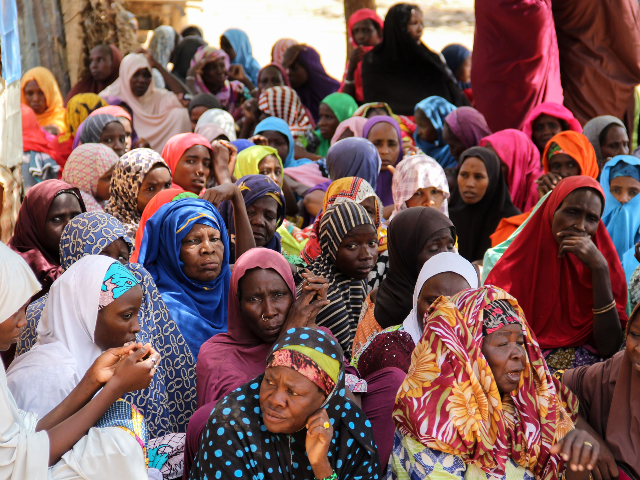Boko Haram jihadis seized two towns in Nigeria’s Borno state on Wednesday, killing many people as they set houses and government buildings ablaze.
Citing the state-run News Agency of Nigeria and a top local government official, the Punch newspaper reports that the terrorists have left the two towns, noting:
Normalcy has returned to Gubio and Magumeri communities of Borno after the Wednesday night attacks coordinated by Boko Haram insurgents.
The News Agency of Nigeria reports that residents in the affected areas returned to their homes after the insurgents’ attacks at Gubio and Magumeri headquarters of Magumeri and Gubio Local Government Areas of the state.
The insurgents attacked the communities at about 6:00 pm [Wednesday]; torched residential homes, schools, offices, looted food items and abducted a member of the Civilian Joint Task Force.
Zanna Modu, the chairman of the Gubio Local Government Council, indicated that the terrorists “withdrew on Thursday,” according to the Punch.
“The situation is calm; people returned to their homes on Thursday,” Usman Zanna, a Nigerian lawmaker who represents both the Gubio and Magumeri communities, reportedly added Thursday.
However, the Premium Times reports that jihadis remain in control of the towns.
Unlike other news outlets, the newspaper assigned blame for the attack to the Islamic State (ISIS/ISIL) affiliate in West Africa (ISWA), a Boko Haram offshoot.
“The terrorists, mostly of the Boko Haram ISWA affiliate, have remained in control of Gubio, Magumeri and contiguous communities,” the Premium Times reports.
Jihadis control “large swathes of northern Borno where the military has largely pulled out amidst relentless deadly attacks on troops and their bases,” it adds.
The ISIS affiliate allegedly broke away from Boko Haram in 2016 over leadership issues, but the groups appear to consist of some of the same fighters.
Borno is the birthplace of Boko Haram. The terrorists carried out the recent attacks less than two weeks after a similar assault on Gubio.
A local government official told Sahara Reporters on the condition of anonymity:
It is unfortunate that a week after a deadly attack which took place in Gubio that led to the withdrawal of troops, other armed insurgents stormed Gubio town at about 6 pm, performed their maghrib prayers about 6:30 pm in Gubio Mosque before they wreaked havoc on innocent civilians with setting ablaze of houses and public structures.
Maghrib refers to one of the five obligatory daily prayers of Islam performed after sunset.
Without providing a specific figure, local news outlets report that Wednesday’s attack left “many” people dead.
An unnamed source told the Daily Trust:
They walked freely in our town, many houses were burnt and telecommunications mast equally burnt, many are feared dead. We can’t tell you how many people were killed, but certainly many lost their lives.
Furthermore, the Premium Times reveals that the attack left “thousands” of civilians trapped in the towns on Wednesday.
The attacks came weeks after Nigerian President Muhammadu Buhari’s administration falsely claimed that his government “defeated” Boko Haram.
Buhari has repeatedly claimed victory over the group since taking office in 2015, but the group has continued to wreak havoc.
Boko Haram’s insurgency marked its tenth anniversary in late July.
On Monday, the United Nations said the Boko Haram death toll had reached 35,000 since it began its insurgency a decade ago.
The U.N. figures echo a tally by the Council on Foreign Relations (CFR).
According to CFR, the Boko Haram war has left 35,820 people dead, including jihadis, state actors, and civilians.

COMMENTS
Please let us know if you're having issues with commenting.